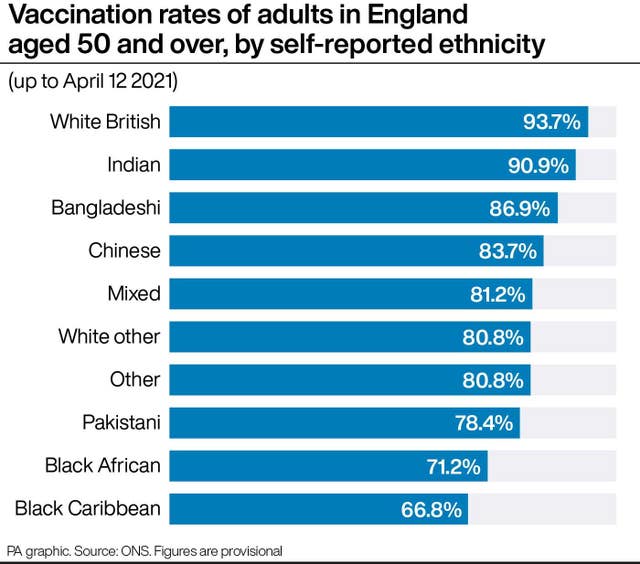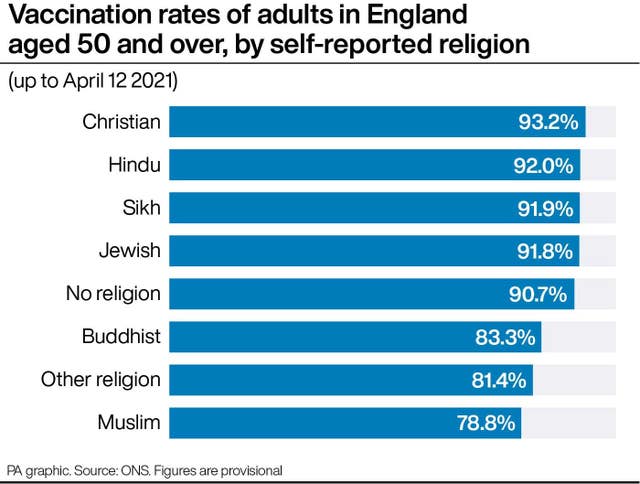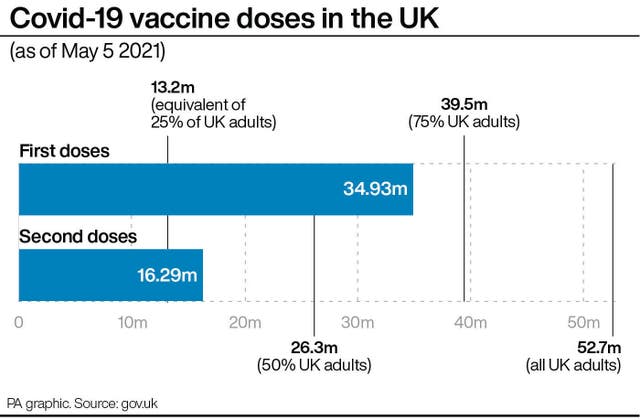Black adults aged 50-plus least likely to have received Covid jab
Three in 10 eligible black adults have not been vaccinated, according to estimates in England.

Older black adults remain the ethnic group least likely to have received a coronavirus jab, with figures suggesting around three in 10 have not been vaccinated.
The lowest rates were estimated among those aged 50 and over identifying as black Caribbean and black African, at 66.8% and 71.2% respectively, the Office for National Statistics (ONS) said.
This compares with 93.7% of white British adults, with estimates for all ethnic minority groups lower than this.
Rates were also estimated to be lower in people of Muslim or Buddhist faiths, those who do not speak English, those living in more deprived areas and disabled people.

It is the second time the ONS has published analysis on vaccination rates in older people broken down by age, sex, ethnicity, religious affiliation, disability and deprivation.
It analysed data from the National Immunisation Management Service (NIMS) on people over 50 between December 8 and April 12, linking it to people’s NHS numbers.
Differences in geography, socio-demographic factors and underlying health conditions do not fully explain the lower vaccination rates among ethnic minority groups, the ONS found.
Statistical modelling showed the odds of not having received a dose of a vaccine were 7.4 times greater for people from black Caribbean backgrounds compared with people of white British ethnicity.
After adjusting for age, sex, socio-demographic characteristics and underlying health conditions, the odds were still 5.6 times greater.
For people identifying as black African, the unadjusted odds were six times greater, while the adjusted odds were 3.4 times higher.
The ONS also found a relationship between proficiency in English language, as recorded in the 2011 census, and vaccination rates.
Estimated rates were 75.3% among those who do not speak English at all, 75.9% for people who do not speak English well, and 92.7% for those whose main language is English.

The vaccination rate among people living in the most deprived areas of England was 87.8%, compared with 94.5% in the least deprived, the ONS said.
Disabled people who reported being limited a lot in their day-to-day activities had a vaccination rate of 89.3%, compared with 92.3% for non-disabled people.
The lowest rates among religious groups were for those who identified as Muslim (78.8%) or Buddhist (83.3%), while the figures for people identifying as Christian or Hindu were 93.2% and 92% respectively.
The ONS said lower take-up could reflect access problems.
Hugh Stickland, head of strategy and engagement at the ONS, said the lower rates are “broadly similar to the groups who express vaccine hesitancy”, adding: “However, the reasons for lower uptake are likely to be complex, including for example being unable to travel to a vaccination centre.”
Separate statistics released by the ONS on Thursday show that 7% of adults in Britain reported vaccine hesitancy between March 31 and April 25.
This is a fall from 9% earlier in the year, from January 13 to February 7.
Black or black British adults were the most likely ethnic group to report vaccine hesitancy, and younger adults were more likely to do so than older people.
Three in 10 black or black British adults reported hesitancy, as did 13% of adults aged 16-29.
The ONS defined hesitancy as adults who have refused a vaccine, say they would be unlikely to get a vaccine when offered, and those who responded “neither likely nor unlikely”, “don’t know” or “prefer not to say” when asked.
Caroline Lucas, vice-chairwoman of the All-Party Parliamentary Group on coronavirus, said community engagement had shown it was possible to “overcome deep-seated mistrust” but that it must be done at the grassroots level rather than “imposed by Whitehall”.
She warned that introducing vaccine passport schemes risked worsening inequality and “alienating” communities with lower take-up.
Dr Ben Kasstan, a medical anthropologist at the University of Bristol, said the data raised urgent questions about the delivery of the vaccination programme in ethnic and religious minority communities and lessons learned.
He said: “Putting issues in accessibility aside, policymakers need to look at how long-running issues of trust and social exclusion may be being directed towards the coronavirus vaccine programme, and thinking intersectionally across race, religion, and socioeconomic status will be essential as we move forward.”
Salman Waqar, general secretary of the British Islamic Medical Association, said the situation is “optimistic and much improved” compared with the earlier surveys on take-up.

He said efforts – often led by Muslim healthcare professionals and imams – have successfully increased confidence and take-up, with the Government and NHS recognising the vital role of faith communities.
He continued: “Barriers still remain, some of which are well understood (such as historic inequalities, Islamophobia, targeted misinformation, non-inclusive services), and others need further exploration.
“What is clear is that more work and investment is needed to continue the efforts in building confidence and easing access to vaccines in these communities, especially amongst younger cohorts.”
NHS England medical director of primary care, Dr Nikki Kanani, said acceptance rates were improving among all ethnic minorities.
She said: “This progress is a direct result of dedicated NHS teams who know and understand their communities, targeted engagement with faith leaders, pop-up clinics in places of worship, practical support like advice translated into more than 20 languages and strong, vocal backing from high profile voices like comedian Lenny Henry and TV star Adil Ray.”
Dr Habib Naqvi, director of the NHS Race and Health Observatory, said: “Although steps have been taken to increase levels of confidence and trust in the vaccine amongst our diverse populations, the figures in this report show there is still more work to be done – including ramping-up tailored, culturally sensitive public health communications, delivered across a range of platforms.”
A Department of Health and Social Care spokeswoman said the Government is working to ensure no-one is left behind, adding: “Vaccines are our way out of this pandemic – they’re safe, effective and already saving thousands of lives – and today’s ONS statistics show vaccine confidence remains high.”





